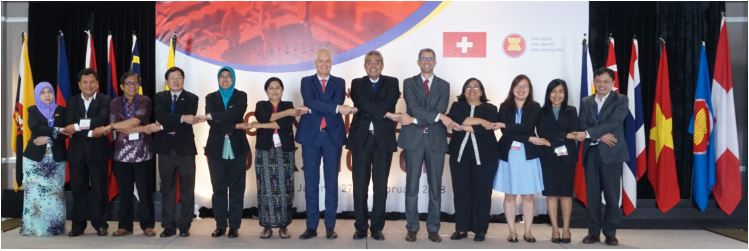ASEAN-Switzerland

[Photo of the event from
asean.org]
Consultation Workshop on Technical Vocational Education and Training (TVET)
Summary
ASEAN Member States and Switzerland have long-forged relationships through a number of cooperative activities including in education. At the 49th ASEAN Foreign Ministers’ Meeting (AMM) on 24 July 2016 in Vientiane, Lao PDR, Switzerland was conferred the status of Sectoral Dialogue Partner of ASEAN. After this important step, both sides agreed to intensify the exchange on several matters of mutual interest. Technical and Vocational Education (TVET) has been identified by both sides as a priority field.
Against this backdrop it was decided to organize a joint workshop on the current situation of TVET in the different ASEAN member states and on the experiences of Switzerland, both with its own system as well as with its longstanding support of TVET system development in partner countries.
The event was convened on 27-28 February 2018 in Jakarta, gathering high officials from education and labour ministries as well as representatives of the private sector of all ASEAN member states, SDC officials, and experts involved in TVET activities in the region. It was co-chaired by DSG Vongthep Arthakaivalvatee, Deputy Secretary-General, ASEAN Socio-Cultural Community Department, ASEAN Secretariat and H.E. Mr. Tim Enderlin, Swiss Ambassador and Director of Cooperation Laos and the Mekong Region. Its main objective was to pave the way for a more intensified collaboration between ASEAN and Switzerland by exploring common interests and identifying thematic areas for a possible joint programme in the near future.
The workshop clearly elucidated that TVET ranks high on the agendas of all the ASEAN member states, but with different approaches and challenges according to the economic and industrial development of the individual member states. Modernising their TVET systems to increase productivity and competiveness and at the same time offer more and better employment opportunities for the young generation is a priority for all of them. The workshop discussions touched upon a broad range of problems and challenges the different countries are confronted with in the course of their current reform efforts. Three main issues emerged in almost all speeches, contributions and results of the different working groups, and were finally identified by the participants as the most relevant subjects that could be addressed in the framework of a joint ASEAN-SDC programme:
Private sector involvement in TVET
The TVET systems in the ASEAN countries, and in particular in CLMV (Cambodia, Laos, Myanmar und Vietnam), are predominantly school- or training centre–based. The private sector plays an only limited role in TVET governance, financing and in training delivery. However, there is a growing interest of ASEAN governments in scaling-up work-based learning, i.e. internships and apprenticeships, and in exploring opportunities for dual vocational training according to the Swiss model.
Quality assurance in TVET
Quality is another burning issue that was mentioned frequently during the workshop. The participants referred to the lack of well-established accreditation systems and procedures for TVET providers in many of their countries, and to the absence of reliable assessment and certification for graduates, which is still in its infancy in most ASEAN countries. Another detrimental aspect for the quality of TVET delivery in the ASEAN region is the low skills level of many teachers, trainers and in-company instructors, in particular with regard to practical skills. There are very limited capacities for both, initial and in-service training of TVET teachers and trainers.
Reputation of TVET
The reputation of TVET is low in the ASEAN countries, not the least because of the issues mentioned above. The lack of quality of training provision and the limited involvement of the private sector do not facilitate smooth labour market integration and career opportunities of graduates. The vast majority of school-leavers opt for academic pathways if and when they have the opportunity. TVET remains an option for the low-performers and for the poor who cannot afford university studies, which aggravates its reputation problem.
The ASEAN secretariat took up this clear vote of the workshop participants and proposed these three issues as potential subjects for the envisaged joint ASEAN-SDC project. SDC is currently about to formulate a project proposal to address one or more of these issues.
The press release of the event is available
here.
Event Summary by Wolfgang Schlegel (VSD Backstopping Team)
